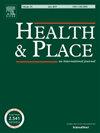Newness, unfamiliarity, and cultural beliefs; social and behavioural barriers to COVID-19 vaccination among the Dumagat Remontado, an Indigenous population in the Philippines
IF 3.8
2区 医学
Q1 PUBLIC, ENVIRONMENTAL & OCCUPATIONAL HEALTH
引用次数: 0
Abstract
Indigenous Peoples faced unique challenges that contributed to vaccine hesitancy, including limited healthcare access, mistrust of medical institutions, and adherence to traditional practices. While vaccination played a critical role in improving public health, Indigenous communities often remained underserved and sceptical about its benefits, particularly in the context of COVID-19. Thus, this study aimed to explore the perceptions and experiences of the Dumagat Remontado, an Indigenous Peoples in the Philippines, on COVID-19 vaccination. Through their narratives, the study aimed to identify the factors that affect their intention to get vaccinated and uptake of the COVID-19 vaccine. A qualitative research design was employed, with in-depth interviews conducted with 18 respondents in Rizal, Philippines in January 2023 and the Framework Approach used for data analysis. Findings were presented within the World Health Organization's Behavioural and Social Drivers (BeSD) framework for vaccination. Key factors influencing vaccine intention included government policies, social norms, perceived disease severity, susceptibility, and vaccine benefits and risks. Health experts and vaccinated individuals were identified as the most favoured sources of vaccine information. Accessibility of services, healthcare worker demeanour, and information availability surfaced as practical issues which hindered vaccine uptake. The study underscored the importance of involving the Dumagat Remontado in conceptualising and implementing vaccination programmes, as well as utilising vaccine champions, real-life narratives, and the local language in information dissemination. These contributions emphasised the need for inclusive public health strategies to address vaccine hesitancy among Indigenous Peoples, ultimately promoting equitable access to healthcare and improving vaccination rates.
求助全文
约1分钟内获得全文
求助全文
来源期刊

Health & Place
PUBLIC, ENVIRONMENTAL & OCCUPATIONAL HEALTH-
CiteScore
7.70
自引率
6.20%
发文量
176
审稿时长
29 days
期刊介绍:
he journal is an interdisciplinary journal dedicated to the study of all aspects of health and health care in which place or location matters.
 求助内容:
求助内容: 应助结果提醒方式:
应助结果提醒方式:


